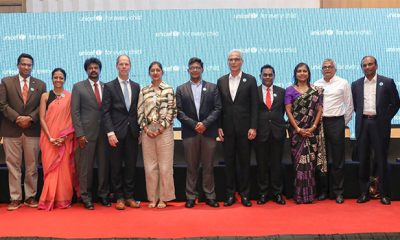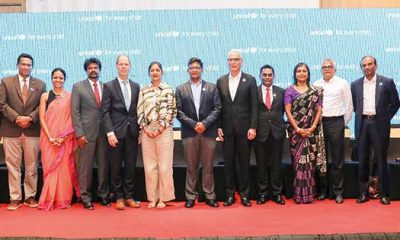Business
Developing plans and policies without young people is a futile exercise: UNICEF Sri Lanka

Series of crises SL has faced have dealt a heavy blow
Reviving presents SL with an opportunity to address its long-running challenges
by Sanath Nanayakkare
Young people are not only the present but also the future; developing plans and policies without them is a futile exercise, they need to be the front and centre of the discussions because they are the ones with fresh ideas and the most at stake, in terms of the sustainability of the planet and the tourism sector, Christian Skoog, Representative, UNICEF Sri Lanka said in Colombo yesterday.
“Here in Sri Lanka, we have a gift. That gift is the 4.4m young people. The contribution young people can make to the tourism sector is immense. But to harness their energy and ideas, there is a need to provide them the skills, training and opportunities to thrive within a dynamic and fast-growing industry,” he said.
“Across the world it is young people who are the hungriest for travel. They are seeking new experiences and looking to broaden their horizons. They serve not only as your potential clientele, they are also your best marketers through tools like social media. Indeed, Sri Lanka has been named one of the world’s most instagramable locations,”
“Rarely has there been such an urgent moment for us to ensure the energy and enthusiasm of young people to contribute to Sri Lanka’s sustainable development is given expression. And rarely has there been such an opportune moment to discuss building back better in the context of sustainable tourism.
Skoog made these points at an event hosted by the Chamber of Tourism and Industry held to mark the World Tourism Day.
Further speaking he said:
“Today we consider how to sustainably revive a sector upon which the livelihoods of so many people depend and we discuss how we can effectively respond to the challenges that confront us. When I learned in late 2020 that I would be appointed to serve as UNICEF Rep in Sri Lanka, I felt invigorated by the prospect of coming. Of course, much of that vigour was related to the work I expected to undertake here. But I confess that part of my excitement came from listening to my friends saying it is “paradise” and “best vacation spot”. Whenever I have had the opportunity to explore Sri Lanka since, I have been captivated by the landscapes, the biodiversity, the food, and the warmth of the people I meet across this island. But of course, I also arrived at a time of profound economic hardship for so many. I know those impacts have been felt deeply across the tourism sector. Many of you have struggled valiantly to keep your businesses running, and to maintain decent livelihoods for workers across the sector: from hoteliers to taxi drivers to souvenir sellers, to tour guides, to wait staff.”
“Sri Lanka’s tourism sector has contended with a succession of adverse events in the past 3 years: 1) The devastating terrorist attacks of Easter 2019 reduced arrivals by 18%. 2) COVID-19 crisis shut borders & paralysed air travel. 3) Conflict in Ukraine entirely cut a tourism market that until recently represented 25% of foreign arrivals. And, of course, economic crisis continues to pose an array of challenges. Reviving tourism in a manner that is sustainable and inclusive is one of the key tools to help us navigate through this crisis.”
“I would like to reiterate the importance of sustainable tourism in Sri Lanka, to touch upon the relationship between sustainable tourism and the SDGs, and mention the role young people can play as we re-think tourism in Sri Lanka.”
“Tourism is a critical component of the economy; it is Sri Lanka’s 3rd-largest source of foreign exchange, and contributed about 5% of GDP, pre-COVID. Tourism is also a major employer of people across the island. In fact, globally, tourism employs one in every ten people.”
“Let’s be under no illusions. The series of crises SL has faced have dealt a heavy blow. But the task we now face in reviving the sector also presents us with an opportunity to address some its long-running challenges.”
“These include over-tourism and other unsustainable practices; contributions to Climate Change; pollution; a loss of biodiversity; and a lack of inclusion. As an island nation with extraordinary biodiversity, Sri Lanka is particularly vulnerable to the adverse effects of unsustainable tourism.”
“Indeed, when tourism arrivals plunged during the pandemic, many destinations took the opportunity to reflect on the toll irresponsible or unsustainable practices had on their ecologies; and they resolved to do this differently. We too, should resolve to do things differently.”
“As tourism returns, the demand for ethical and sustainable products and experiences continues to rise. We can no longer consider sustainable tourism offerings as a choice. Costs incurred in adopting practices that benefit the environment and community, need to be looked at as investments which provide the industry with an advantage.”
“The tourism sector, as a whole, needs to focus on marketing Sri Lanka as not only a desirable destination because of its natural beauty, culture and heritage, but also differentiating it as a sustainable destination.”
“I believe that harnessing tourism’s positive contribution to sustainable development and the mitigation of the sector’s adverse effects calls for strong partnerships and decisive action by all tourism stakeholders.”
“Events like this give us an opportunity to build partnerships: to reflect, and to share ideas and strategies. Creating true partnerships of both public and private sector operators in the country is key to our ability to revive the sector and develop sustainable tourism as a tool for a better future for Sri Lanka.”
“With the right safeguards in place, tourism can provide decent jobs, particularly for young people, it can inspire us to protect life on land and life below water, it can help build resilient, gender-equal, inclusive economies and societies that work for everyone. And it can help Sri Lanka thrive,” the UNICEF representative said.
Business
‘Mangala Samaraweera – a democrat who opposed racism and corruption’

‘The late Mangala Samaraweera was a true democrat who staunchly opposed racism in all its forms. He was also against corruption. He was a unique person, an achiever, an artist, a creative person, well-read and practical-minded, former President Chandrika Bandaranaike Kumaratunga said. She believes that if Mangala Samaraweera (MS) lived, Sri Lanka would have been changed entirely for the better.
The former President was speaking at a special Mangala Samaraweera commemorative event held at the auditorium of the Bandaranaike Centre for International Studies (BCIS), Colombo on April 22nd, which featured the donation of Minister Samaraweera’s wide-ranging and abundant private collection of books to several Sri Lankan libraries, including that at the BCIS and the Colombo Public Library.
The programme was termed, ‘Reading with Mangala: Insights into his Personal Library and its Onward Gifting to His Fellow Sri Lankans.’ The event marked MS’ 69th birthday.
The book donation was facilitated by the family of the late minister which coordinated closely with the BCIS to make the event a success. Besides former President Kumaratunga, the event was graced by the BCIS Council of Management, public personalities, associates and colleagues of the former minister, BCIS staffers, students and well-wishers.
At the outset of the commemoration, MS was introduced eloquently and at some length to the audience by the late minister’s niece, Chanchala. MS came across to us, basically, as a multi-talented, well-read, colourful and knowledgeable personality. A resourceful person who could change things for the better.
In a panel discussion featuring many dignitaries on Mangala the person and the public figure, former President Chandrika Bandaranaike Kumaratunga mentioned the following as well: ‘Mangala had a vision for the country as a public figure and conceptualized policies in accordance with it. Among other things, he persuaded the entire SLFP to resolve the ethnic issue by political means.
‘In a survey done by a foreign company it was revealed initially that only 23 percent of the country’s Sinhala community supported a political solution to the ethnic conflict. I asked Mangala to tell me how our ideas could be taken to the public. He launched work on this project with 19 ministers. One positive result from these deliberations was the ‘Sudu Nelum Movement’ which Mangala backed to the hilt.
‘Subsequently, the message of a negotiated solution was taken to the country through innovative means, like Street Theatre and the ‘Thawalama’ campaign. Mangala gave of his best to these projects. Subsequently, in a second survey done it was disclosed that 68 per cent of the people accepted a political solution. Thus, did Mangala’s positive approach pay off. He stuck to his principles and never betrayed them.’
By Lynn Ockersz
Business
Japan ready to take on fresh loan projects for Sri Lanka – Ambassador Isomata

Japan is ready to undertake fresh loan projects for Sri Lanka since the country has completed its debt restructuring process, Japanese ambassador to Sri Lanka Akio Isomata said.
“Japan is ready to consider taking on such commitments if there is a request from the Sri Lankan end but the undertaking of such projects depends on Sri Lanka’s debt servicing ability, ambassador Isomata added.
The ambassador made these remarks in response to a query raised during a round table discussion organised by the Pathfinder Foundation recently at the Taj Samudra’s Colombo Club. The theme of the event was, “Japan’s response to the US reciprocal tariffs and Japan- Sri Lanka relations in a turbulent world”. The forum was presided over by Pathfinder Foundation chairman ambassador Bernard Goonetilleke.
The ambassador also said that Japan was a victim of corruption in Sri Lanka and expressed optimism that the government would tackle the issue.
“Earlier, there were reports about some Japanese companies facing issues in Sri Lanka in securing investments. Japanese companies strictly observe compliance obligations and therefore never offer bribes or kickbacks, ambassador Isomata explained. Ambassador Isomata said that he attended the function to mark the launch of the ‘National Anti -Corruption Action Plan’ and listened to President Anura Kumara Dissanayake speaking of efforts to address the issue. The ambassador emphasized the need to implement the plan.
Responding to the President’s remarks that politicians belonging to his National People’s Power (NPP) are not involved in any form of corruption, the ambassador said it is equally important to address the same involving Sri Lankan bureaucrats.
Commenting on Japan- Sri Lanka bilateral relations, Isomata said Sri Lanka is a very important partner for Japan in many ways.” As Sri Lanka’s economy is in the process of getting back on track with efforts underway to implement the IMF agreement, along with the debt restructuring agreement, I don’t think Japanese companies will come immediately to make new investments at this stage. But as the Sri Lankan economy goes back on track in a stable manner, I think we can cultivate the interest of Japanese investors to take a closer look at opportunities in Sri Lanka for further investment. We need cooperation with Sri Lankan people, he said.
The ambassador added: “We are seeing increasing numbers of young Sri Lankans going to Japan for employment in Japanese companies. There are two kinds of programmes for inviting young foreign workers into Japan right now.
“One is called the TITP -Technical Intern Training Programme. The second one, recently started, is SSW -Specified Skilled Worker Programme. Under these two programmes, an increasing number of Sri Lankan youngsters are going to Japan right now. We have opened up eight industrial sectors for Sri Lankan workers, starting with caregiving, hotel accommodation, food industry, agriculture, construction and most recently, the transportation sector, like bus driving and truck driving. This will strengthen Japan’s labour market. We need a young labour force because Japan is facing the problem of an ageing society.”
By Hiran H Senewiratne
Business
SLT-MOBITEL surges ahead with robust Q1 2025 profit growth

The SLT Group has reported a Profit After Tax (PAT) of Rs. 2,001 million for the first quarter ended March 31, 2025, a surge from Rs. 156 million in Q1 2024, reflecting effective financial management and improved operational efficiency.
SLT Group demonstrated strong performance for the first quarter of 2025, with revenue increasing 3.4% to Rs. 27,851 million. The growth was primarily driven by Mobitel’s contribution of increased revenues while SLT PLC revenue remained stable.
The Group’s cost optimization initiatives continued to yield positive results, with operating expenses decreasing 2.9% amount to Rs. 710 million compared to the same period last year. The reduction, combined with revenue growth, led to a 13% increase in EBITDA to Rs. 10,443 million.
At company level, SLT PLC reported a marginal 0.7% increase in revenue of Rs. 117 million compared to Q1 2024, primarily driven by growth in enterprise, small and medium enterprises (SMEs) and broadband streams.
SLT PLC also achieved significant cost declines, with operating expenses decreasing 5.2% amount to Rs. 838 million Year-on-Year (YoY). Notably, electricity expenses fell 38.3% following tariff reductions in March and July 2024. Vehicle hiring and fuel costs also decreased 22.7%, and repair and maintenance expenses curtailed by 12.5%.
SLT PLC specifically demonstrated impressive profit growth, with PAT increasing by 369.9% to Rs. 1,344 million compared to Rs. 286 million in Q1 2024. The notable performance was supported by a 380% surge in Profit Before Tax (PBT) to Rs. 1,920 million and a 60.3% increase in Operating Profit to Rs. 2,538 million.
Mobitel demonstrated strong financial performance in the first quarter of 2025, reporting notable revenue growth supported by the growth of data services. Total revenue reached Rs. 11.8 billion, reflecting the company’s success in capitalizing on demand for digital connectivity. Enhanced top-line performance, combined with effective cost reduction initiatives, led to a significant improvement in profitability.
EBITDA increased by 28.5%, resulting in a healthy EBITDA margin of 30%. Operating profit (EBIT) also recorded a marked improvement by 392%, with a 7% EBIT margin. PBT saw considerable growth, and the company successfully turned around its financial position, moving from a net loss in the first quarter of 2024 to a net profit of Rs. 477 million in the same period of 2025.
Reaffirming its commitment to delivering superior network experiences and the widest coverage across the island, SLT-MOBITEL Mobile was recognized as the country’s fastest 4G network for 2024 by Ookla®, the global leader in internet testing and analysis at Mobile World Congress Barcelona, held in March 2025.
Leveraging strong Q1 results as a foundation for 2025 growth, the SLT Group aims to continue the ongoing digital transformation journey delivering innovative solutions and expanding services to meet customer needs. Through operational efficiency and digital advancement, investing in advanced technologies to strengthen market position, the Group remains committed to supporting Sri Lanka’s digital economy and creating value for all stakeholders.
-

 Features3 days ago
Features3 days agoSAITM Graduates Overcome Adversity, Excel Despite Challenges
-

 Business6 days ago
Business6 days agoJohn Keells Properties and MullenLowe unveil “Minutes Away”
-

 News3 days ago
News3 days agoDestined to be pope:Brother says Leo XIV always wanted to be a priest
-

 Sports3 days ago
Sports3 days agoASBC Asian U22 and Youth Boxing Championships from Monday
-

 Foreign News4 days ago
Foreign News4 days agoMexico sues Google over ‘Gulf of America’ name change
-

 Opinion6 days ago
Opinion6 days agoRatmalana: An international airport without modern navigational and landing aids
-

 Opinion3 days ago
Opinion3 days agoDrs. Navaratnam’s consultation fee three rupees NOT Rs. 300
-

 Features2 days ago
Features2 days agoChampioning Geckos, Conservation, and Cross-Disciplinary Research in Sri Lanka
















